Tips are like particular utilities utilized by internet builders to make it simple to map round in a program code. Not like different variables, guidelines retailer THE addresses of different variables.
What Are Tips in C?
A pointer is a variable pointing to the deal with of some other variable. It’s declared at the side of an asterisk image (*). The syntax to claim a pointer is as follows:
datatype *var1
The syntax to assign the deal with of a variable to a pointer is:
datatype var1, *var2;
var2=&var1;

In How Many Tactics Can You Get entry to Variables?
You’ll get right of entry to a variable in two tactics.
- Direct Get entry to: You’ll without delay use the variable title to get right of entry to the variable.
- Oblique Get entry to: You employ a pointer to get right of entry to that variable.
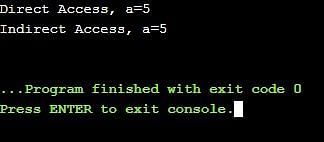
Instance:
#come with<stdio.h>
int primary()
{
int a=5, *ptr;
ptr=&a;
printf(“Direct Get entry to, a=%dn”,a);
printf(“Oblique Get entry to, a=%dn”,*ptr);
go back 0;
}

What Are the Other Sorts of Tips?
There are majorly 4 sorts of guidelines, they’re:
- Null Pointer
- Void Pointer
- Wild Pointer
- Dangling Pointer
Null Pointer:

Should you assign a NULL price to a pointer throughout its declaration, it is named Null Pointer.
Syntax:
Int *var = NULL;
Instance:
#come with<stdio.h>
int primary()
{
int *var = NULL;
printf(“var=%d”,*var);
}

Void Pointer:

When a pointer is asserted with a void key phrase, then it is named a void pointer. To print the worth of this pointer, you wish to have to typecast it.
Syntax:
void *var;
Instance:
#come with<stdio.h>
int primary()
{
int a=2;
void *ptr;
ptr= &a;
printf(“After Typecasting, a = %d”, *(int *)ptr);
go back 0;
}

Wild Pointer:

A wild pointer is most effective declared however no longer assigned an deal with of any variable. They’re very difficult, and so they would possibly reason segmentation mistakes.
Instance:
#come with<stdio.h>
int primary()
{
int *ptr;
printf(“ptr=%d”,*ptr);
go back 0;
}

Dangling Pointer

- Assume there’s a pointer p pointing at a variable at reminiscence 1004. Should you deallocate this reminiscence, then this p is named a hanging pointer.
- You’ll deallocate a reminiscence the usage of a unfastened() serve as.
Instance:
#come with<stdio.h>
#come with<stdlib.h>
int primary()
{
int *ptr=(int *)malloc(sizeof(int));
int a=5;
ptr=&a;
unfastened(ptr);
//now this ptr is referred to as dangling pointer.
printf(“After deallocating its reminiscence *ptr=%d”,*ptr);
go back 0;
}

Up to now, you might have realized concerning the sorts of guidelines. Now, you are going to glance into simpler sides. Let’s talk about some use circumstances of guidelines in C.
Our Loose Lessons with Certificates
What Are the Use Instances of Tips in C?
- Pointer mathematics
- Pointer to pointer
- Array of guidelines
- Name through price
- Name through reference
Pointer mathematics:
- Increment: You’ll use this operator to leap from one index to the following index in an array.
Syntax:
ptr++;

Instance:
#come with <stdio.h>
int primary() {
int arr[3] = {50, 150, 200};
int *ptr;
ptr = arr;
for (int i = 0; i < 3; i++)
{
printf(“Price of *ptr = %dn”,*ptr);
printf(“Deal with of *ptr = %dn”,ptr);
ptr++;
}
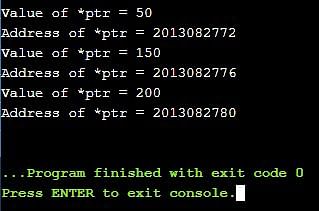
- Decrement: You’ll use this operator to leap from one index to the former index in an array.
Syntax:
Ptr–;

Instance:
#come with<stdio.h>
int primary()
{
int arr[3]={50, 150, 200};
int *ptr;
ptr = &arr[2];
for (int i=0;i<3;i++)
{
printf(“Price of *ptr = %dn”, *ptr);
printf(“Deal with of *ptr = %dnn”, ptr);
ptr–;
}
}
- Integers added to a Pointer: You’ll use this operator to leap from one index to the following ith index in an array.
Syntax:
ptr+=i; // the place ‘i’ is an integer

Instance:
#come with <stdio.h>
int primary() {
int arr[5] = {10, 100, 200, 300, 500};
int *ptr;
ptr = &arr[0];
for (int i = 0; i < 5; i++) {
printf(“Price of *ptr = %dn”, *ptr);
printf(“Deal with of *ptr = %dnn”, ptr);
ptr=ptr+2;
}
}
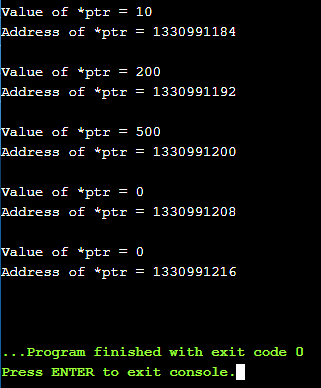
- Integers Subtracted from a Pointer: You’ll use this operator to leap from one index to the former ith index in an array.
Syntax:
ptr-=i; // the place ‘i’ is an integer

Instance:
#come with <stdio.h>
int primary() {
int arr[5] = {10, 100, 200, 300, 500};
int *ptr;
ptr = &arr[4];
for (int i = 0; i<5; i++)
{
printf(“Price of *ptr = %dn”, *ptr);
printf(“deal with of *ptr = %dnn”, ptr);
ptr-=2;
}
}
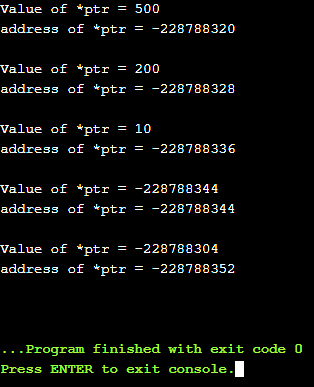
- Priority:
- Operators * and & are given the similar priorities as unary operators (increment++, decrement–).
- The unary operators *, &, ++, – are evaluated from proper to left in the similar expression.
- If a P issues to an X variable, then you’ll interchange X with *P.
|
Expression |
Similar Expression |
|
Y=X+1 |
Y=*P+1 |
|
X=X+10 |
*P=*P+10 |
|
X+=2 |
*P+=2 |
|
++X |
++*P |
|
X++ |
(*P)++ |
Pointer to Pointer:
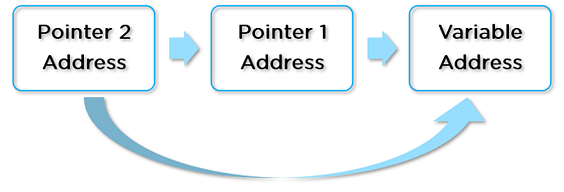
On this scenario, a pointer will not directly level to a variable by means of some other pointer.
Syntax:
Int **ptr;
Instance:
#come with <stdio.h>
int primary ()
{
int var, *ptr1, **ptr2;
var = 10;
ptr1 = &var;
ptr2 = &ptr1;
printf(“Price of var = %dn”, var );
printf(“Price to be had at *ptr1 = %dn”, *ptr1 );
printf(“Price to be had at **ptr2 = %dn”, **ptr2);
go back 0;
}
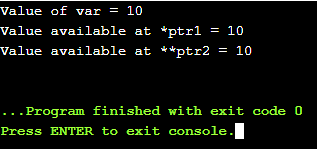
An Array of Pointer:
An array of the pointer is an array whose each and every part is a pointer.
Syntax:
int *arr[n] //the place n is measurement of array.
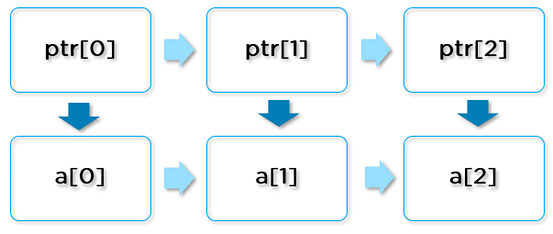
Instance:
#come with <stdio.h>
int primary ()
{
int a[3] = {10, 100, 200},n=3;
int i, *ptr[3];
for ( i = 0; i < 3; i++)
{
ptr[i] = &a[i];
}
for ( i = 0; i < n; i++)
{
printf(“Price of a[%d] = %dn”, i, *ptr[i] );
}
go back 0;
}
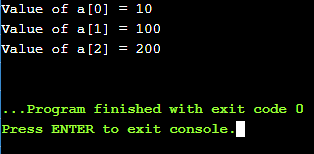
Name Through Price:
In ‘name through price’, you will have to replica the variable’s values and move them within the serve as name as a parameter. Should you alter those parameters, then it does not alternate the worth of the particular variable.
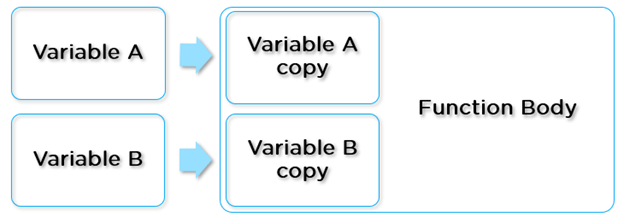
Instance:
#come with<stdio.h>
void alternate(int num)
{
printf(“Sooner than including price within serve as num=%dn”,num);
num=num+100;
printf(“After including price within serve as num=%dn”,num);
}
int primary()
{
int x=100;
printf(“Sooner than serve as name x=%d n”,x);
alternate(x);
printf(“After serve as name x=%d n”,x);
go back 0;
}
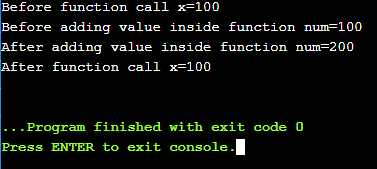
Name Through Reference:
In name through reference, you will have to take the variable’s deal with and move it within the serve as name as a parameter. Should you alter those parameters, then it’s going to alternate the worth of the particular variable as smartly.
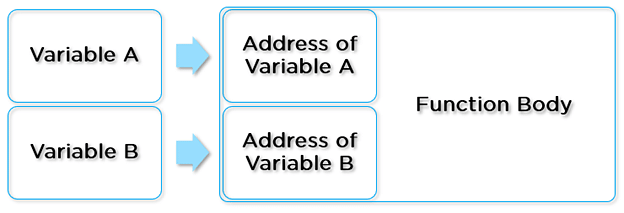
Instance:
#come with<stdio.h>
void alternate(int *num)
{
printf(“Sooner than including price within serve as num=%d n”,*num);
(*num) += 100;
printf(“After including price within serve as num=%d n”,*num);
}
int primary()
{
int x=100;
printf(“Sooner than serve as name x=%d n”,x);
alternate(&x);//passing reference in serve as
printf(“After serve as name x=%d n”,x);
go back 0;
}
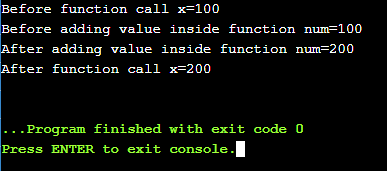
What Are the Benefits of Tips in C?

- Tips in C programming are useful to get right of entry to a reminiscence location
- Tips are a great way to get right of entry to the array construction parts
- Tips are used for the allocation of dynamic reminiscence and the distribution
- Tips are used to construct difficult information constructions like a related listing, graph, tree, and so forth
What Are the Disadvantages of Tips?

- Tips are just a little obscure
- Tips may cause a number of mistakes, reminiscent of segmentation mistakes or unrequired reminiscence get right of entry to
- If a pointer has an improper price, it is going to corrupt the reminiscence
- Tips may additionally reason reminiscence leakage
- The guidelines are quite slower than the variables
What Are the Key Takeaways?
- The Tips in C programming is just a garage location for information in reminiscence
- Tips can be utilized to traverse the array extra successfully
- You’ll use serve as tips to invoke a serve as dynamically
- Pointer mathematics is the method of acting mathematics operations on a pointer
- In an array of guidelines, guidelines can level to purposes, making it easy to name other purposes
Subsequent Steps
“Arrays in Knowledge constructions” may also be your subsequent prevent. Arrays in information constructions may also be useful in aggressive programming and different information construction implementations. Arrays allocate reminiscence in contiguous reminiscence places for all its parts making it more straightforward to get right of entry to parts.
Are you taking a look to be informed additional and grasp as of late’s most sensible programming languages? Smartly, Simplilearn’s Put up Graduate Program In Complete Stack Internet Building program provides you with precisely that and a lot more. This globally identified program will permit you to be told fashionable coding tactics with bootcamp-level depth and acquire all you wish to have to be a full-stack technologist. Do discover the direction as of late.
In case you have any questions on “Tips in C”, please be at liberty to go away them within the feedback segment underneath. Our 24/7 professional crew will resolution all of your queries for you on the earliest!
supply: www.simplilearn.com










